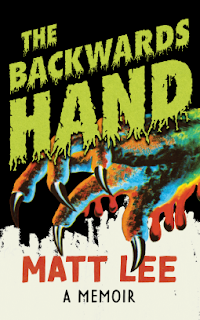The possibility has occurred to me, of course, that this is not just a factor in my copy from Netgalley but an intentional gimmick in the text as a whole, to make a point about neuroplasticity or human adaptability or something, but probably not. Lee isn't interested otherwise in being either subtle or gimmicky; he is here to tell you, very plainly and without sparing anyone's fee-fees, what his life with a very unusual congenital difference has been like.
Lee was born with bilateral radioulnar synostosis; the two bones in his forearms, which actually rotate and cross over when an unaffected human rotates their hands front to back, are fused together in the crooks of his arms. Surgically un-fusing them, at least back when this was offered to him, would unavoidably damage a cluster of nerves located right where the bones are fused, leaving him with constant pain (something I know all about and wouldn't wish on Elon Fucking Musk, for all that he wants to put chips in the brains of people like Matt Lee and myself and maybe all of us because of reasons) and a still-deeply limited range of motion that wouldn't even approach "normal." Not exactly a win-win proposition.
There are notes of existential terror in this text, much of which is devoted to famous disabled people and other "freaks" from history and how they were depicted in art and treated by their families and, most importantly, by the authorities. Lee spends a lot of text, for instance, to the Nazis' euthanasia program, which targeted the mentally and physically disabled; eugenics is never far from the discussion when societies discuss policy toward us. This fear has only grown with the results of the recent U.S. election, of course, but that development was still in the future when this book went to press.
Lee's own story is far less bleak, however. He has married and has a child who does not share his disability, has had an acting career and has developed a clear and concise prose style and a dedication to thorough research that should serve him well moving forward in life -- and, as he takes care to emphasize in The Backwards Hand, he doesn't owe all of the setbacks he has encountered on the way to this state to his disability. Some of it is attributable to his own immaturity, infidelity, or general assholery. Disabled people are neither monsters nor saints; it just took him a while to realize that his disability did not automatically make him a monster.
But man, this book has made it a little harder to go into 2025 with anything like a sanguine attitude. But, like that was going to happen anyway, amirite?
Who knows, maybe we'll end up in the same camp and I'll get to tell him in person that I appreciated this book and told all my friends to read it. Except I'm housebound because nobody will take basic precautions against diseases that could kill us, so instead of actual friends, I'm telling whoever still reads this blog. Read this!

No comments:
Post a Comment
Sorry about the CAPTCHA, guys, but without it I was getting 4-5 comment spams an hour.